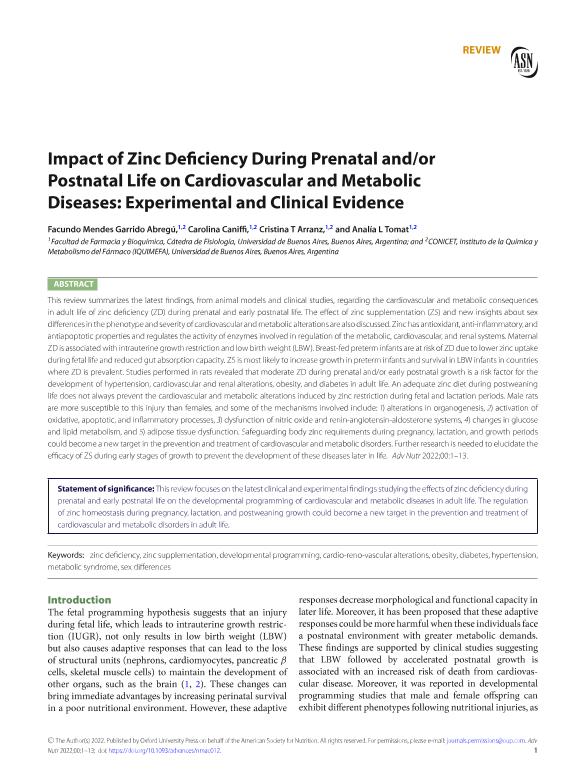Artículo
Impact of Zinc Deficiency During Prenatal and/or Postnatal Life on Cardiovascular and Metabolic Diseases: Experimental and Clinical Evidence
Mendes Garrido Abregú, Facundo ; Caniffi, Carolina Cecilia
; Caniffi, Carolina Cecilia ; Arranz, Cristina Teresa
; Arranz, Cristina Teresa ; Tomat, Analia Lorena
; Tomat, Analia Lorena
 ; Caniffi, Carolina Cecilia
; Caniffi, Carolina Cecilia ; Arranz, Cristina Teresa
; Arranz, Cristina Teresa ; Tomat, Analia Lorena
; Tomat, Analia Lorena
Fecha de publicación:
02/2022
Editorial:
Elsevier
Revista:
Advances in Nutrition
ISSN:
2161-8313
e-ISSN:
2156-5376
Idioma:
Inglés
Tipo de recurso:
Artículo publicado
Clasificación temática:
Resumen
This review summarizes the latest findings, from animal models and clinical studies, regarding the cardiovascular and metabolic consequences in adult life of zinc deficiency (ZD) during prenatal and early postnatal life. The effect of zinc supplementation (ZS) and new insights about sex differences in the phenotype and severity of cardiovascular and metabolic alterations are also discussed. Zinc has antioxidant, anti-inflammatory, and antiapoptotic properties and regulates the activity of enzymes involved in regulation of the metabolic, cardiovascular, and renal systems. Maternal ZD is associated with intrauterine growth restriction and low birth weight (LBW). Breast-fed preterm infants are at risk of ZD due to lower zinc uptake during fetal life and reduced gut absorption capacity. ZS is most likely to increase growth in preterm infants and survival in LBW infants in countries where ZD is prevalent. Studies performed in rats revealed that moderate ZD during prenatal and/or early postnatal growth is a risk factor for the development of hypertension, cardiovascular and renal alterations, obesity, and diabetes in adult life. An adequate zinc diet during postweaning life does not always prevent the cardiovascular and metabolic alterations induced by zinc restriction during fetal and lactation periods. Male rats are more susceptible to this injury than females, and some of the mechanisms involved include: 1) alterations in organogenesis, 2) activation of oxidative, apoptotic, and inflammatory processes, 3) dysfunction of nitric oxide and renin-angiotensin-aldosterone systems, 4) changes in glucose and lipid metabolism, and 5) adipose tissue dysfunction. Safeguarding body zinc requirements during pregnancy, lactation, and growth periods could become a new target in the prevention and treatment of cardiovascular and metabolic disorders. Further research is needed to elucidate the efficacy of ZS during early stages of growth to prevent the development of these diseases later in life.
Archivos asociados
Licencia
Identificadores
Colecciones
Articulos(IQUIMEFA)
Articulos de INST.QUIMICA Y METABOLISMO DEL FARMACO (I)
Articulos de INST.QUIMICA Y METABOLISMO DEL FARMACO (I)
Citación
Mendes Garrido Abregú, Facundo; Caniffi, Carolina Cecilia; Arranz, Cristina Teresa; Tomat, Analia Lorena; Impact of Zinc Deficiency During Prenatal and/or Postnatal Life on Cardiovascular and Metabolic Diseases: Experimental and Clinical Evidence; Elsevier; Advances in Nutrition; 13; 3; 2-2022; 833-845
Compartir
Altmétricas



